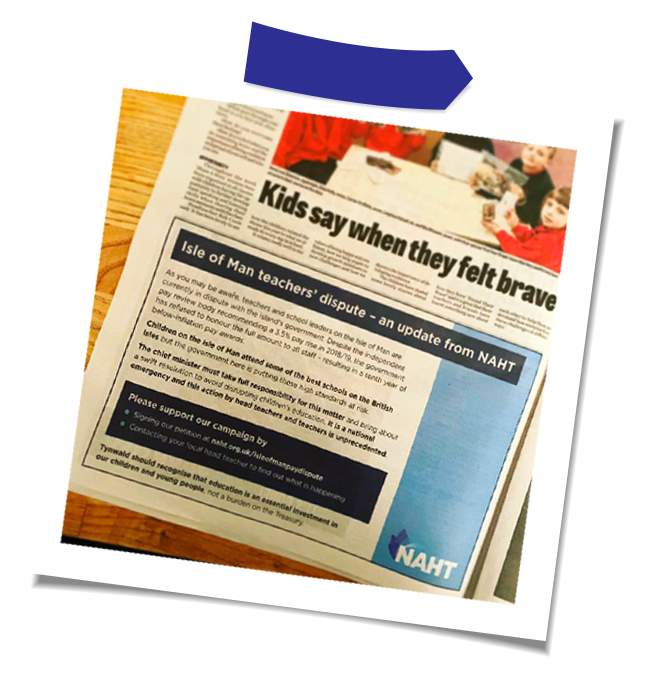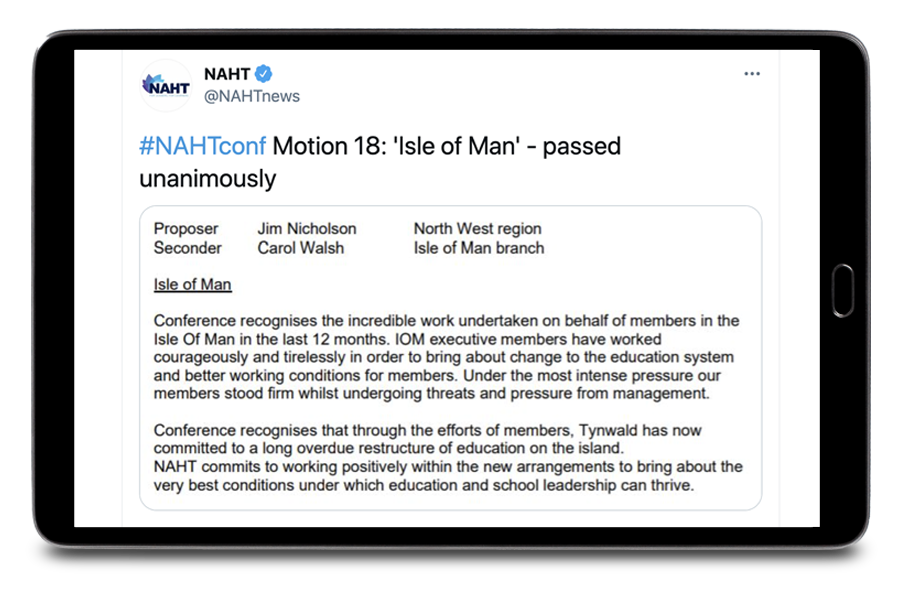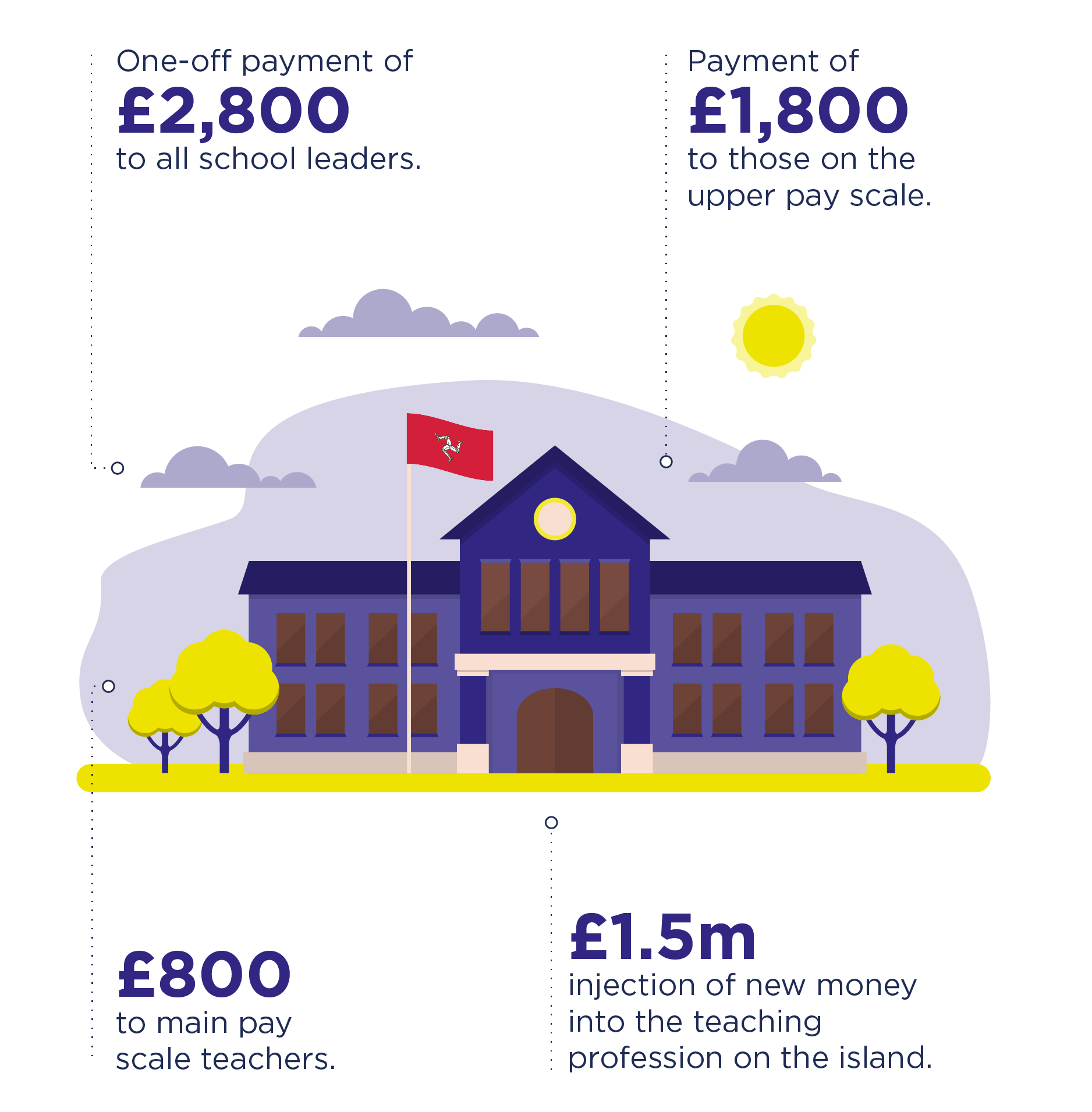

Leadership Focus journalist Nic Paton looks at how members’ action and solidarity resulted in a landmark pay agreement being reached.
The scouring effect of the covid-19 pandemic on schools, education and school leaders has, unsurprisingly, dominated the headlines and news agenda for the past year. On the Isle of Man, however, NAHT members have not only had to deal with challenges of disruption to education, restrictions and lockdowns, but they have also spent much of the past two years locked in a David-and-Goliath pay battle with the island’s government and education department.
It was a bitter dispute where members, and even national officials, were threatened and ministers accused of bullying and being overly ‘combative’. But, as of last autumn, it was one where members’ action and solidarity won through and resulted in a landmark pay agreement being reached along with a string of other conditions.
It led to ministers being forced to fall on their swords, being transferred or sidelined. But most importantly of all, it has laid the foundations for a partnership approach to education on the island for future generations.

ROB KELSALL,
NAHT NATIONAL SECRETARY
As NAHT national secretary Rob Kelsall tells Leadership Focus: “It is a historic agreement. Something we’ve not secured anywhere else. It was a battle of hearts and minds. Critically, for teachers and school leaders, it was about fighting for our own dignity. But we were also fighting for something far bigger: the future of education on the island, and the futures of young people.”
To understand the dispute, you have to go back to the 2018/19 School Teachers’ Review Body’s (STRB’s) recommendation that all teacher and leadership posts receive a 3.5% pay award. This was, as members may recall, followed by then education secretary Damian Hinds deciding to go in a different direction, namely accepting the 3.5% recommendation for teachers, but a lower settlement (2.5%) for those on the upper pay scale, and an even lower pay rise (1.5%) for those in leadership posts.

As a Crown dependency, the Isle of Man had the freedom to veer from Hinds’ decision and implement the full STRB recommendation. However, Ronald Barr – the then chief executive officer of the island’s Department of Education, Sport and Culture (DESC) – decided to follow the English example, much to head teachers’ and other school leaders’ anger.



Isle of Man NAHT branch secretary, who wishes not to be named, takes up the story. “Our pay policy in the Isle of Man meant that they [the department] could basically have done either/or. They could have gone with the secretary of state, or they could have followed their own orbit. They chose to follow the secretary of state, despite the fact that for months and months – years in fact – we had been arguing that, due to the high cost of living on the Isle of Man, our pay had deteriorated in excess of a lot of places, even further than in England.
“The department continually made the right noises, but it did absolutely nothing about it. So, not to go with the STRB’s recommendations felt like the final slap in the face. All teachers and senior leaders on the island felt aggrieved, really aggrieved, because we had been arguing our case for years,” they explain.
Negotiations with the DESC to remedy the situation made little progress, and indeed, relations between the profession and government rapidly worsened. As the branch secretary explains: “There were extensive discussions from September 2018 through to Christmas, but we got absolutely nowhere; they just batted us away. At one point, the CEO said to me (and I paraphrase slightly) ‘you are bashing your head against a brick wall here because senior teachers on this island will not take action. So, therefore, we have the high hand on this and just go away’ – basically.
“At that point, I was livid, absolutely livid. We went to our local executive and talked about it. We decided we needed to pull in HQ, which is when Rob came on board.”
“The overriding view I gained when I first met with head teachers on the Isle of Man was that, yes, they were angry about the Isle of Man adopting the position it had. But it was also that, actually, this was a battle that was about far more than just pay,” agrees Rob.
For example, the pay battle was fought against a backdrop of the Isle of Man government introducing an education bill described by NAHT as ‘draconian’ and which included, among other things, the threat of a custodial sentence for head teachers who it was felt were blocking or obstructing school inspections.
While separate from the pay issue, the fact the government eventually bowed to widespread opposition – including from parents and head teachers – and withdrew the contentious bill in February 2021 is another feather in the cap for NAHT members.
As Rob puts it: “It was about the profession, about school leaders, being listened to and respected, about being treated with dignity. Members felt compelled to stand up and take hold of the situation.”
The reversal of the education bill, in particular, was “a testament to the collective endeavour of all NAHT members on the Isle of Man”, he adds.


“The department continually made the right noises, but it did absolutely nothing about it. So, not to go with the STRB’s recommendations felt like the final slap in the face. All teachers and senior leaders on the island felt aggrieved, really aggrieved, because we had been arguing our case for years,” they explain.

Negotiations with the DESC to remedy the situation made little progress, and indeed, relations between the profession and government rapidly worsened. As the branch secretary explains: “There were extensive discussions from September 2018 through to Christmas, but we got absolutely nowhere; they just batted us away. At one point, the CEO said to me (and I paraphrase slightly) ‘you are bashing your head against a brick wall here because senior teachers on this island will not take action. So, therefore, we have the high hand on this and just go away’ – basically.

“At that point, I was livid, absolutely livid. We went to our local executive and talked about it. We decided we needed to pull in HQ, which is when Rob came on board.”
“The overriding view I gained when I first met with head teachers on the Isle of Man was that, yes, they were angry about the Isle of Man adopting the position it had. But it was also that, actually, this was a battle that was about far more than just pay,” agrees Rob.

For example, the pay battle was fought against a backdrop of the Isle of Man government introducing an education bill described by NAHT as ‘draconian’ and which included, among other things, the threat of a custodial sentence for head teachers who it was felt were blocking or obstructing school inspections.
While separate from the pay issue, the fact the government eventually bowed to widespread opposition – including from parents and head teachers – and withdrew the contentious bill in February 2021 is another feather in the cap for NAHT members.

As Rob puts it: “It was about the profession, about school leaders, being listened to and respected, about being treated with dignity. Members felt compelled to stand up and take hold of the situation.”
The reversal of the education bill, in particular, was “a testament to the collective endeavour of all NAHT members on the Isle of Man”, he adds.
“When we discussed with leaders on the Isle of Man the types of action they felt would be appropriate, one thing they made a point of was that the very last thing they wanted to do was impact the learning of children and young people.”
The result, therefore, was a ‘work to rule’ action starting from that September (2019). “NAHT members were the only ones on the Isle of Man who, in the beginning, were prepared to stand up and be counted,” says Rob.
“We withdrew all our support for the DESC, and we stopped doing things that we did not have to do,” explains the branch secretary. “For example, the department relied on us to interview supply teachers and supply support staff in school. It relied on us to join working parties for policies and so on, and we refused to do all that.”

MAX KELLY,
PRESIDENT OF NAHT ISLE OF MAN
“The DESC also relied on us to engage with it over a whole range of things to do with schools’ accountability,” says Max Kelly, president of NAHT Isle of Man and head teacher of Dhoon Primary School and Laxey Primary School on the island.
“We withdrew our engagement with the SSRE process (the school self-review and evaluation process), which was the Manx government’s way, at the time, of inspecting or quality assuring schools. We also wouldn’t take part in meetings with department officials.
“So, the whole business of the department slowed right down,” he adds.
The action got underway amid much acrimony. As the branch secretary says: “Max and I were threatened with our jobs; there was all sorts happening.” Rob and NAHT general secretary Paul Whiteman even had one meeting with Ronald Barr and Lawrie Hooper (a member of the House of Keys, the island’s directly elected chamber, who was at the time deputising for the education minister) at a local golf course that took a distinctly dark turn. “We were threatened and told we should be ‘careful’ about taking action,” recalls Rob.
NAHT general secretary Paul Whiteman speaking to Manx Radio.
BREAKTHROUGH, BUT A FALSE DAWN
Then, in October 2019, there was a breakthrough, with a 10-point heads of agreement being reached on a possible resolution to the dispute. NAHT members believed the heads of agreement was enough to call off the industrial action. However, within weeks, the agreement was not being adhered to by the DESC. The situation once again quickly escalated.
“At that point, we were on our own; NAHT was the only union taking action,” recalls Rob. “Through the autumn into the spring term of 2020, action was then recommenced. We had a big push on winning over the public, parents and school communities. We took out adverts in all the local papers that countered any false narrative that this was just about teachers’ pay. The arguments we were making in the public domain were that this dispute was far more about the kind of education system we wanted on the Isle of Man. At this point, other unions began to follow our lead and support action; this included ASCL and NASUWT.
“We took our fight to the House of Keys. We had lobbies. We talked directly to the MHKs [Members of the House of Keys]. I think, just because of the weight of the pressure we were bringing to bear, the chief minister finally announced an inquiry into the department, which our members gave evidence to,” he says.
This government-commissioned independent review, announced in February 2020, had been prompted by the ongoing pay dispute and accusations of bullying behaviour by education minister Graham Cregeen, which led to 600 teachers backing a vote of no confidence in the minister (of which more later).
“I think of it as akin to a David-and-Goliath battle because the full weight of the Isle of Man government was behind the department. There were lots of long-standing people in post there. But the determination of members carried us through; we encouraged them to keep the faith, and eventually, we broke through in November last year,” says Rob.



BREAKTHROUGH, BUT A FALSE DAWN
Then, in October 2019, there was a breakthrough, with a 10-point heads of agreement being reached on a possible resolution to the dispute. NAHT members believed the heads of agreement was enough to call off the industrial action. However, within weeks, the agreement was not being adhered to by the DESC. The situation once again quickly escalated.
“At that point, we were on our own; NAHT was the only union taking action,” recalls Rob. “Through the autumn into the spring term of 2020, action was then recommenced. We had a big push on winning over the public, parents and school communities. We took out adverts in all the local papers that countered any false narrative that this was just about teachers’ pay. The arguments we were making in the public domain were that this dispute was far more about the kind of education system we wanted on the Isle of Man. At this point, other unions began to follow our lead and support action; this included ASCL and NASUWT.

“We took our fight to the House of Keys. We had lobbies. We talked directly to the MHKs [Members of the House of Keys]. I think, just because of the weight of the pressure we were bringing to bear, the chief minister finally announced an inquiry into the department, which our members gave evidence to,” he says.
This government-commissioned independent review, announced in February 2020, had been prompted by the ongoing pay dispute and accusations of bullying behaviour by education minister Graham Cregeen, which led to 600 teachers backing a vote of no confidence in the minister (of which more later).

“I think of it as akin to a David-and-Goliath battle because the full weight of the Isle of Man government was behind the department. There were lots of long-standing people in post there. But the determination of members carried us through; we encouraged them to keep the faith, and eventually, we broke through in November last year,” says Rob.






MINISTERIAL DEPARTURES AND AN AGREEMENT
Part of that breakthrough was down to the departure of DESC CEO Ronald Barr in September, after the independent review into the dispute had criticised him for having a ‘combative’ relationship with teachers.
As the branch secretary highlights: “I think the critical thing was the change in leadership at the department, which has led to a complete change of tone and the fact the interim CEO and his team are now listening and advocating for teachers.”
The deal agreed includes a one-off payment of £2,800 to all school leaders to offset the shortfall in the 2018 settlement, plus a payment of £1,800 to those on the upper pay scale and £800 to main pay scale teachers.
“There is also a commitment, when all of this is over, to looking at pay more widely again because we all know the one-off payment is a drop in the ocean. But it was an important signal and commitment to listening to teachers and working with us and towards an appropriate pay deal in the future, which we all know is long overdue,” says the branch secretary.
The deal includes a £1.5m injection of new money into the teaching profession on the island plus a clause committing to future pay negotiations when inflation goes above a certain percentage.

“It cannot be overestimated: the power of action,” agrees Annette Baker, former head of Ramsey Grammar School on the island, now retired, who was NAHT’s secondary school representative during the dispute.
“The icing on the cake was that, as a branch, we used to have about 50 members, but because of the dispute, that number has more than trebled. NAHT on the Isle of Man was also mostly the preserve of primary heads, but now it is both primary and secondary. It is the only branch across the whole national union that when we look at middle leaders, it has more in membership than senior leaders,” she adds.
“If we want to have a decent education system on the Isle of Man, or anywhere else for that matter, it has to start on the basis of people being treated as equals, as professionals,” emphasises Rob.
MINISTERIAL DEPARTURES AND AN AGREEMENT
Part of that breakthrough was down to the departure of DESC CEO Ronald Barr in September, after the independent review into the dispute had criticised him for having a ‘combative’ relationship with teachers.
As the branch secretary highlights: “I think the critical thing was the change in leadership at the department, which has led to a complete change of tone and the fact the interim CEO and his team are now listening and advocating for teachers.”

The deal agreed includes a one-off payment of £2,800 to all school leaders to offset the shortfall in the 2018 settlement, plus a payment of £1,800 to those on the upper pay scale and £800 to main pay scale teachers.
“There is also a commitment, when all of this is over, to looking at pay more widely again because we all know the one-off payment is a drop in the ocean. But it was an important signal and commitment to listening to teachers and working with us and towards an appropriate pay deal in the future, which we all know is long overdue,” says the branch secretary.
The deal includes a £1.5m injection of new money into the teaching profession on the island plus a clause committing to future pay negotiations when inflation goes above a certain percentage.

“It cannot be overestimated: the power of action,” agrees Annette Baker, former head of Ramsey Grammar School on the island, now retired, who was NAHT’s secondary school representative during the dispute.
“The icing on the cake was that, as a branch, we used to have about 50 members, but because of the dispute, that number has more than trebled. NAHT on the Isle of Man was also mostly the preserve of primary heads, but now it is both primary and secondary. It is the only branch across the whole national union that when we look at middle leaders, it has more in membership than senior leaders,” she adds.
“If we want to have a decent education system on the Isle of Man, or anywhere else for that matter, it has to start on the basis of people being treated as equals, as professionals,” emphasises Rob.
“I remember when it came to the vote around Graham Cregeen, we had to go to a church because the Isle of Man government had banned NAHT from holding any meetings in its premises. When you are faced with things like that, the resilience of people shines through. The branch secretary went to a local vicar and asked him to open his church, one of the island’s biggest. And then we saw coachloads of teachers and leaders turning up – more than 600 were in the church that night.

“At that point, you just knew there was something here that was almost like a movement; you just knew we were not going to lose as long as we kept the faith,” Rob adds.


